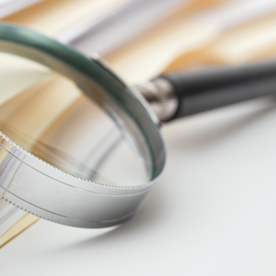
Although PCOS can present itself in different ways, at least 7 in 10 women will experience excess hair growth, or hirsutism (1).
For some women, hirsutism can be the most challenging aspect of PCOS. Such visible symptoms can impact body image, mental health, and self-esteem.
But of course, you always have the final say on how your body looks. There’s nothing wrong with facial and body hair. However, if it’s something that bothers you, there are steps you can take to prevent and manage it.
What is hirsutism?
Primarily affecting the PCOS community, hirsutism causes excess facial and body hair in women. You may experience abnormal hair growth on your upper lip, chest, back, and abdomen.
Why does PCOS cause hirsutism?
Like many PCOS symptoms, hirsutism is caused by elevated androgens (‘male’ hormones, like testosterone, androstenedione, and dehydroepiandrosterone) that characterise the condition.
 Androgens make hair follicles grow at a greater rate than they normally would. All women have vellus hairs (‘peach fuzz’) on their faces and body, but androgen hormones stimulate follicles to make terminal hairs, which are thicker and darker.
Androgens make hair follicles grow at a greater rate than they normally would. All women have vellus hairs (‘peach fuzz’) on their faces and body, but androgen hormones stimulate follicles to make terminal hairs, which are thicker and darker.
Practical tips for PCOS facial hair growth
Again, it’s worth repeating that your body is yours – and yours alone. If you want to embrace your hair growth, great. But if it’s something you want rid of, you can take some practical steps to help manage it.
Hair removal
Getting rid of excess hair from PCOS is similar to traditional ways of removing unwanted hair. You can shave it, pluck it, wax it and even laser it.
However, it’s always worth remembering that although you’re ‘physically’ removing the hair, it may grow back because of your androgen levels. Just like hair on other parts of your body.
Shaving
Shaving is a quick, painless, and safe way to remove your hair temporarily. However, it’s likely that you will need to shave frequently to achieve a smooth finish, which may irritate the skin and cause ingrown hairs.
Depilatories
Depilatories – often found in creams, lotions and gels – penetrate to and through the hair follicle but don’t target the root. This means you can remove hair without being left with any stubble, but it won’t prevent hirsutism or future hair growth. It’s also worth nothing that if you have sensitive skin, the chemicals may irritate it, so it’s best practice to always do a test patch before use.
Waxing
Though more painful than shaving, waxing plucks the hair from the hair follicle, which means it takes longer for the hair to grow back compared to shaving. However, like shaving, if you have sensitive skin regular waxing can take its toll on your skin, leading to inflamed hair follicles, ingrown hair, and skin irritation.
The key benefit of waxing is that over a long period of time it can weaken the hair follicle, meaning hair can grow back finer and less regularly than before.
Electrolysis
Electrolysis removes hair by passing an electric current into the hair follicle via a fine needle, which destroys the hair follicle permanently. It can be painful, and you may need multiple treatments, but it can be a great option for the face, chest, and back. What’s good about electrolysis is that it is a longer-lasting option for hair removal compared to over the counter options.
Laser hair removal
Laser hair removal is a method of permanent hair reduction, much like electrolysis. However in this method of hair removal, the heat generated by a laser destroys the hair follicle.
Although laser hair removal is becoming more affordable, it remains an expensive option. Plus, you may need many treatments to get a significant reduction in your excess hair. Still, if you want permanent results, laser hair removal is one of the best options for hirsutism and there are lots of service providers on the market.
If you’re considering this method of hair removal, make sure your practitioner is registered with the Healthcare Commission or British Medical Laser Association.
Medical treatments for hirsutism
On the medication front, there are several treatments available, which aim to tackle the root cause of hirsutism.
Eflornithine cream
Eflornithine cream isn’t a depilatory but works by slowly reducing hair growth. It can be applied after using one of the above hair removal techniques.
It’s important to apply the cream regularly. After two or three months of regular use, it may start to reduce hair growth. Though effective, eflornithine cream can cause acne breakouts in some women.
Anti-androgen treatments
Anti-androgen treatments include medicines that block the action of androgens and may help reduce hirsutism, along with other PCOS symptoms, like hair loss and acne. Your doctor may prescribe the contraceptive pill (including co-cyprindiol), or medications, like cyproterone, spironolactone, and finasteride.
These treatments can take four to six months to work, and you have to use them regularly, or hair may start growing again.
Emotional support
Of course, hirsutism can affect more than the physical body. It can also make some women feel extremely self-conscious and insecure, often leading to anxiety and depression (2).
There’s no shame in seeking support if you need help. Joining a local PCOS group or chatting with a trained therapist are valid and important options.
Diarising self-care is equally important so try to treat yourself with kindness and compassion. Ring-fence 30 minutes daily to do something that makes you feel good, such as yoga, meditation, or dancing.
You can learn more about supporting your mental health with PCOS here.
How to stop facial hair growth in females naturally
Simple lifestyle changes like eating well, exercising regularly, and reducing stress can help manage PCOS symptoms, including hirsutism.
Eat low GI
Biologically speaking, you have to control your insulin levels to manage excessive hair growth. High insulin levels increase androgen levels in your body: more insulin means more androgens, and more androgens means more unwanted hair.
Eating foods with a low glycaemic index (GI) can help manage insulin levels (2). GI refers to the rate at which a carbohydrate affects your blood sugar levels.
Try building your meals around low-GI carbohydrates, like whole-grain bread, brown rice, quinoa, oats and legumes.
Limit dairy
In recent years, some research has suggested the hormone found in most dairy products, IGF-1, may increase the growth of hair follicles (4).
Interestingly, this hormone has also been associated with acne and sebum production, other common symptoms of PCOS (5).
Thankfully, we live in an age with an ever-growing market of delicious dairy alternatives, which can make cutting back much easier.
Try myo-inositol
Most people with PCOS could benefit from taking myo-inositol. Besides supporting menstrual regularity and ovulation, weight management, and acne, it may also play a role in reducing hirsutism.
One study reported that excessive hair growth significantly diminished with 6 months of myo-inositol treatment, which is hugely promising (6).
The recommended dose of myo-inositol for women with PCOS is 2 grams in the morning and 2 grams in the evening. For convenience, choose powdered myo-inositol and mix it with water or juice.
You can learn more about using myo-inositol for PCOS here.
Choose spearmint tea
There’s also a case to suggest drinking more spearmint tea may improve the androgen levels of those with PCOS.
In one study, subjects with PCOS were given two cups of spearmint tea daily to measure its effect on hirsutism (7). Although the trial only lasted 30 days – admittedly, not long enough to see any noticeable changes in hair growth – researchers hinted at the tea’s anti-androgen properties.
With this in mind, perhaps you might want to swap your afternoon coffee with a cup of spearmint.
Find out more
Experiencing excess facial and body hair is a very normal side effect for women with PCOS. Although we understand how distressing it can be, we hope it reassures you knowing there are many ways to manage it, including seeking emotional support.
Of course, if you choose to embrace your hair growth, amazing. The only thing that matters is that you feel happy and comfortable in your skin.
If you found this piece on hirsutism useful, you can find similar guidance on our dedicated PCOS hub. Alternatively, please get in touch with our team of expert Nutrition Advisors, who are on hand to provide free, confidential advice.
References:
-
Polycystic ovary syndrome (PCOS) (no date) ACOG. Available online: https://www.acog.org/womens-health/faqs/polycystic-ovary-syndrome-pcos?utm_source=redirect&utm_medium=web&utm_campaign=int
-
Ekbäck MP, Lindberg M, Benzein E, Årestedt K. (2014) Social support: an important factor for quality of life in women with hirsutism. Health Qual Life Outcomes 12:183.
-
Radulian G. (2009) Metabolic effects of low glycaemic index diets. Nutr J 8:5.
-
Rajaeieh G, et al. (2014) The Relationship between Intake of Dairy Products and Polycystic Ovary Syndrome in Women Who Referred to Isfahan University of Medical Science Clinics in 2013. Int J Prev Med 5(6):687–694.
-
Meinik B. (2012) Dietary intervention in acne. Dermatoendocrinol 4(1):20–23.
-
Minozzi M. (2008) Treatment of hirsutism with myo-inositol: a prospective clinical study. Reproductive BioMedicine Online 17(4):579-582.
-
Grant P. (2010) Spearmint herbal tea has significant anti-androgen effects in polycystic ovarian syndrome. A randomized controlled trial. Phytother Res. (2):186-8.
Related Posts?
Disclaimer: The information presented by Nature's Best is for informational purposes only. It is based on scientific studies (human, animal, or in vitro), clinical experience, or traditional usage as cited in each article. The results reported may not necessarily occur in all individuals. Self-treatment is not recommended for life-threatening conditions that require medical treatment under a doctor's care. For many of the conditions discussed, treatment with prescription or over the counter medication is also available. Consult your doctor, practitioner, and/or pharmacist for any health problem and before using any supplements or before making any changes in prescribed medications.

Olivia
Olivia Salter has always been an avid health nut. After graduating from the University of Bristol, she began working for a nutritional consultancy where she discovered her passion for all things wellness-related. There, she executed much of the company’s content marketing strategy and found her niche in health writing, publishing articles in Women’s Health, Mind Body Green, Thrive and Psychologies.
View More



